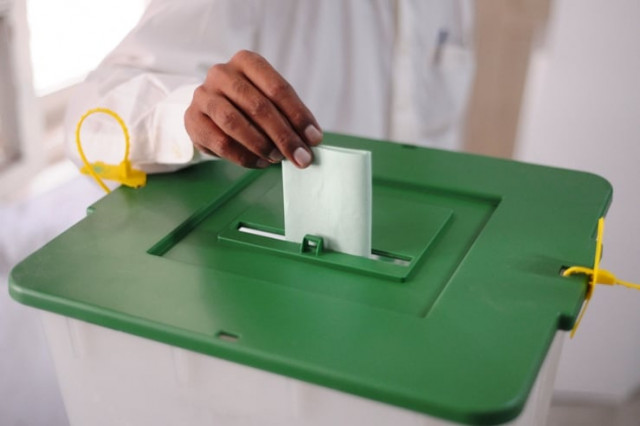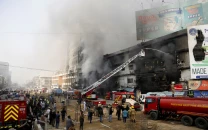May 11 elections: A year after polls, tribunals wade through complaints
Fervour, optimism that drove the elections faded away when electoral irregularities marred the democratic transition.

Fervour, optimism that drove the elections faded away when electoral irregularities marred the democratic transition. PHOTO: AFP
Today, a year has passed since the country held historic elections that turned the page on many counts. The country saw first-time voters and its first civilian, democratic transfer of power.
However, the fervour and optimism that drove the elections soon faded away, when rigging allegations made headlines and electoral irregularities marred the country’s democratic transition.
During the first year of the government, however, it seems like the electoral process is not yet complete as the country witnessed massive by-elections and minimal decisive action by election tribunals.
The Election Commission of Pakistan (ECP), the body that supervises election matters in the country, set up post-election tribunals comprising retired judges of the high courts to hear poll complaints.
It received a staggering 435 complaints. The commission decided around 30 cases on its own through summary trials.
The remaining complaints were referred to 14 tribunals – five of them set up for Punjab and three each in the remaining three provinces. These tribunals were supposed to decide a case within 120 days of receiving it, yet dozens of cases are still pending.
According to the latest statistics provided by the ECP, the tribunals have announced decisions in around 300 cases in one year. Of the 100 pending cases are some high-profile ones, including the four constituencies in Lahore challenged by Imran Khan’s Pakistan Tehreek-e-Insaf.
The tribunals sent 32 cases to the National Database and Registration Authority (NADRA) for voters’ thumbprint verification. NADRA reported back on around 20 constituencies, while the rest are still pending.
Even though their progress is slow, the ex-judges’ tribunals and the thumbprint verification process is a step in the right direction. The tribunals so far have found grave anomalies in many cases and ordered a re-poll in around two dozen constituencies, both in the National Assembly and the provincial assemblies.
With outdated laws and the government’s reluctance to make the ECP an autonomous body, the procedural framework exercised by the commission has become obsolete, leaving ample opportunities for irregularities.
A report recently released by FAFEN, a non-governmental body that observes elections, revealed that as many as 71,397 irregularities and violations of electoral processes were observed on 38,274 polling stations across 263 National Assembly constituencies on Election Day.
The ECP relies on the lower judiciary and government servants, mostly teachers, to supervise the elections. Based on their local political affiliations, starting from their own appointment procedure when they join government service, these officials never work impartially nor do they bother to follow any ECP code of conduct and prescribed procedures.
The challenge could be overcome. ECP needs a pool of some 1,000-1,500 credible government officers to serve as returning officers (RO), enough for the entire electoral exercise. These officials could be given training on electoral laws and procedures to supervise the polls.
This can save the ECP from the embarrassment it faced during the May 11, 2013 polls when the ROs, instead of judging the qualification of candidates, focused on their knowledge of Islam.
Ironically, a number of complaints came up against the ROs and polling staff throughout the country, but the ECP did not take action against even a single official.
Moreover, the commission is without a chief since July last year. The Supreme Court had given the government till March 19 to appoint a Chief Election Commissioner. But neither the Pakistan Muslim League-Nawaz government nor the former ruling party Pakistan Peoples Party, in opposition now, seem to be in no hurry to fill the important slot.
Outdated laws
According to the law, campaigning stops 72 hours before polling day. Candidates and their supporters are barred from setting up camps within a 400-metre radius from the polling stations. And those who violate this ban have to pay a meagre Rs1,000 in fines.
Inside the polling station, the political agent of any of the candidate can challenge the authenticity of a voter. He can contest his case with the presiding officer who has first class magistrate powers and can decide a case through a summary trial on the spot, undermining the electoral process.
There is also a need to reform the laws related to political finance. Under the existing laws, the ECP acts as a mere post office and publishes the assets of the elected representatives and political parties every year without any verification.
Published in The Express Tribune, May 11th, 2014.



















COMMENTS
Comments are moderated and generally will be posted if they are on-topic and not abusive.
For more information, please see our Comments FAQ